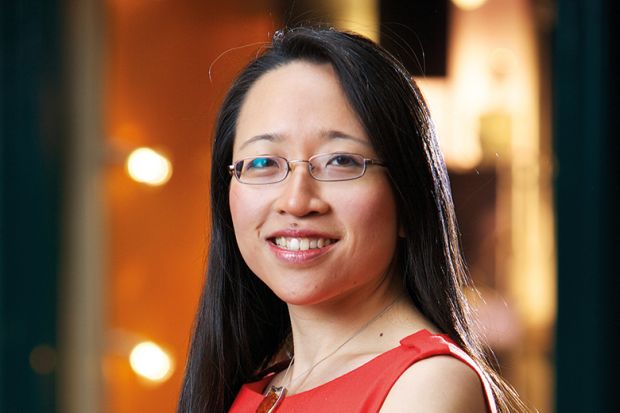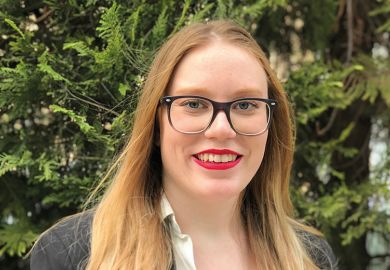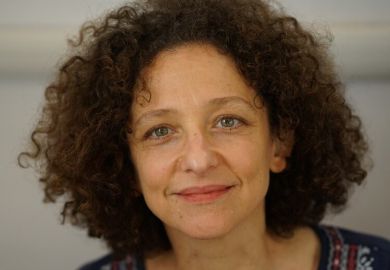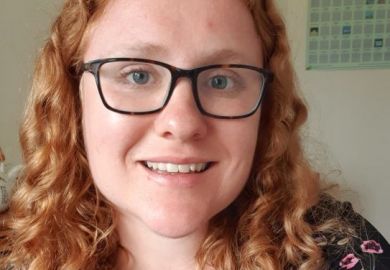Eugenia Cheng is scientist in residence at the School of the Art Institute of Chicago – where she teaches abstract mathematics to arts students – a former senior lecturer in pure mathematics at the University of Sheffield, a concert pianist and artist. She is maths columnist for The Wall Street Journal, and her YouTube videos have been viewed over 15 million times. One of her previous books, How to Bake Pi, offered “an accessible introduction to the logic and beauty of mathematics” via “insights from the kitchen”. Her latest book, The Joy of Abstraction: An Exploration of Maths, Category Theory and Life, is published this month.
Where were you born?
I was born in Hampshire but soon afterwards my family moved to rural Sussex.
How has this shaped who you are?
In rural Sussex in the 1970s and 1980s there were not many non-white people. My parents are immigrants from Hong Kong, and everyone assumed we must be related to the family who ran the Chinese takeaway. I wanted to try my best to fit in, but I also knew I would never really fit in because I looked different. Unfortunately, there was never a chance to forget that, between people pulling “slitty eye” faces at me, or saying “ching chang chong”, or well-meaning friends at school begging me to say something to them in Chinese. In a way this experience of not fitting in prepared me for being a woman in the very male-dominated field of mathematics. I was so used to not fitting in for my entire life, that it didn’t faze me to be the only female person in a room full of mathematicians later. My response was to be galvanised to prove myself, through hard work, and then help others have a better time.
What is abstract maths?
Abstraction in general is a process where we temporarily ignore some details about a situation in order to focus on some deep aspects of it. For example, we might perform an abstraction from everyday objects and ignore all the details about them except how many there are, and that’s how we get numbers. We then treat the numbers as real things, and study how they behave: addition, subtraction and so on. However, this wouldn’t be called “abstract maths” now because we’re so used to it, even though it’s more abstract than counting actual oranges into a bag at the supermarket. So really calling something “abstract maths” is always relative to what we’re used to. For me, abstract maths mostly refers to my research field, which is category theory. Category theory grew from finding similarities between pieces of maths, so it’s a level even more abstract than maths already was. But to me the abstraction has a point, which is to make more connections between more things and to find deeper explanations for why things are going on. This means I’m able to use it to understand not just other fields of maths like topology (the study of the shape of space) and group theory (concerned with abstract forms of symmetry) but also “real-life” issues such as questions of social justice and divisive political arguments.
How would you convince someone who hated maths at school that they should be interested in abstract maths?
Actually, I wouldn’t try! I don’t think anyone “should” be interested in abstract maths. What I do want to try to convince everyone of is that there is more to maths than whatever they learned at school: that maths isn’t just about numbers and equations, but just like all academic disciplines, it’s a way to think more clearly about the world around us. In fact, abstraction can help us to empathise with other people, as we can find abstract similarities between their struggles and ours, which means we have a way to understand something about what they’re going through without having gone through it ourselves.
What made you choose a wider public engagement role in maths, rather than a more traditional academic career?
I really care about public engagement with maths, and about the fact that so many people are put off maths at school. And I also care about representation, and was bothered by the fact that the only mathematicians described by the media or in fictional accounts were all a similar sort of person, by which I mean white men who are socially awkward. So I wanted to put myself forward as an example of a mathematician who isn’t like that.
Much of your academic career has been spent in Chicago and Sheffield. What are the best and worst things about life in those two cities?
Many people think of Sheffield as a lovely, friendly place, but unfortunately I did not have a good time there. I met with hostility from both the university and the city, by being non-white, female, young and “different”. I didn’t really share many interests: I don’t drink real ale, and I don’t like going for walks in the countryside. I felt disrespected at work, and I was often shouted at in the street, with people yelling things like “Go back to where you f-ing came from!” or “I bet you don’t even f-ing speak English”. Chicago is a city of experimentation and invention, and that suits me. It’s also a city of terrible segregation and racism against black people, and I must acknowledge that as a person of Chinese origin the racism I suffer is not nearly as bad; moreover, it seems to me that racism against Chinese people is worse in the UK than it is in the US, even though racism overall is worse in the US because of the history of slavery that cannot be separated from the culture of the country, no matter how much some people try to argue that it is in the past.
john.morgan@timeshighereducation.com
CV
2001-04 research fellow in pure mathematics, Newnham College, Cambridge
2002 PhD, mathematics, University of Cambridge
2004-06 L.E. Dickson instructor, department of mathematics, University of Chicago
2006-07 Marie Curie fellow, department of mathematics, University of Nice Sophia Antipolis
2007-16 senior lecturer in pure mathematics, University of Sheffield
2015-present scientist in residence, School of the Art Institute of Chicago
2015 How to Bake Pi: An Edible Exploration of the Mathematics of Mathematics
2017 Beyond Infinity: An Expedition to the Outer Limits of Mathematics
2018 The Art of Logic in an Illogical World
2020 x+y: A Mathematician’s Manifesto for Rethinking Gender
2022 The Joy of Abstraction: An Exploration of Math, Category Theory, and Life
Appointments
Letlhokwa George Mpedi has been appointed vice-chancellor of the University of Johannesburg. Currently Johannesburg’s deputy vice-chancellor, academic, he will take on the role in March next year, succeeding Tshilidzi Marwala, who has been appointed rector of the United Nations University in Tokyo. Previously he was executive dean of Johannesburg’s Faculty of Law. Professor Mpedi said his predecessors had “built a strong university, and I see many opportunities to take the institution’s ambitious strategy forward”.
Jo-Anne Murray is joining the University of Leeds this month as its first pro vice-chancellor, digital transformation. Previously she was assistant vice-principal for digital education and professor of educational innovation at the University of Glasgow. “Creating this role…signals the intent and importance the university places on the role of technology in all aspects of life, which aligns with my passion around the power of technology to help enhance and shape the future of education, research, innovation and enterprise,” Professor Murray said.
Eloise Scotford has been promoted to be dean of the UCL Faculty of Laws, succeeding Piet Eeckhout. She is professor of environmental law at UCL, and previously served as the faculty’s vice-dean (research).
Douglas Haynes has been named vice-provost for academic personnel and programs at the University of California. He was previously vice-chancellor for equity, diversity and inclusion at the University of California, Irvine.
David Main is the Royal Agricultural University’s new pro vice-chancellor (academic planning and resources). He is professor of production animal health and welfare at the Cirencester institution.
Scott Snyder is joining Western Sydney University as chief information and digital officer. He was previously chief operating officer at the University of the Sunshine Coast and Charles Darwin University.
Simon Yuen has been appointed lecturer in fashion communication at Arts University Plymouth.
Register to continue
Why register?
- Registration is free and only takes a moment
- Once registered, you can read 3 articles a month
- Sign up for our newsletter
Subscribe
Or subscribe for unlimited access to:
- Unlimited access to news, views, insights & reviews
- Digital editions
- Digital access to THE’s university and college rankings analysis
Already registered or a current subscriber?




